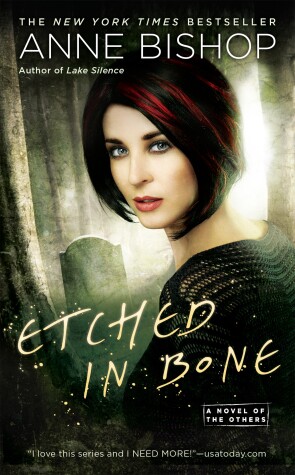Reviewed by Quirky Cat on
I put off reading this book for far too long, and if I’m being honest that was partially because I wasn’t ready to say goodbye to the characters I’ve grown very fond of, such as Meg and Simon, as well as Tess and Henry and all of the others. I know if I give it a chance I’ll end up liking the new characters just as much, but saying goodbye is still very difficult (I’m sure more readers sympathize with that).
Warnings first: There’s a decent amount of talk (and implication) about certain (human) females being pimped out by the abusive men in their lives. It’s pretty uncomfortable at times, especially when a younger boy starts imitating this behavior (very disturbing). There’s also a scene where sexual assault does occur; it’s done from the perpetrator’s perspective, and you can clearly see his thoughts because of it, and thus know he wanted to do more. It’s disturbing and may upset some people, so please be warned.
So you probably remember everything that happened in the last novel (and if not you should probably stop reading this review?). A lot of the events previously were on a global scale, while Etched in Bone is on a slightly smaller scale. The Terra Indigene are looking towards Lakeside to answer a very important question: How much human do we want to keep?
That question can be interpreted in many different ways, and the construal is partially dependent on who is the one considering it. It could mean how many humans they’re going to allow to live (I’d certainly understand the temptation to sort out and remove all HFL members). Or it could mean what sort of humans will be allowed to remain (minor differences in description, but it could be the difference between allowing just the Intuits to stay or the Intuits and select humans). Or they could be referring to human technology, customs, and products. More likely the question is meant to encompass all of these concerns.
The real problem is having this sort of question resting on your shoulders. Can you imagine being any member of the Lakeside Courtyard, knowing your actions could decide the fate of thousands? That goes double for Meg and Simon (the elders of the Terra Indigene seem particularly fond of her, so this may either save or damn the human race).
Because everything and everyone is so focused on Lakeside right now, all of the problems seem so much smaller, especially following a global event like the one that occurred in Marked in Flesh. Which explains some of the complaints I’ve seen from unhappy readers. All of the problems that occur in this novel revolve solely around the residents of Lakeside Courtyard and their family. That means the pool from which to pull an antagonist from is somewhat limited.
I’ll confess I didn’t really like the villain of this story (and trust me, you’ll know who I’m referring to the minute he’s introduced, there’s no subtlety about him or his behavior). I’m not sure if Anne Bishop did too good of a job making him nasty, or if it was something else (perhaps the idea that this man is representing the human race?) but I just really did not enjoy any scene that included him.
While I didn’t like the antagonist himself, I did appreciate the reason behind his staying in the Courtyard. I can understand the logic of the elders here, and even though it was obvious they didn’t understand his type of human enough to understand the dangers (they believe that since he couldn’t hurt them he wasn’t a threat, which is incorrect considering those they care for can be hurt by this man). Naturally their underestimation of this man led to the whole ploy biting them in their behinds, but I can honestly see this sort of situation happening.
I know some people were upset with the conclusion as far as Meg and Simon’s romance is concerned (don’t worry, I’m going to be vague here for the sake of those that haven’t read it), but I personally was pleased with it. The focus has always been more on the emotional side of things, especially when one considers the trauma Meg has gone through. This makes what happen feel the most realistic to me. I also felt that it showed Simon’s true feelings for Meg, and vice versa. Plus, I’ll just say it, it was cute.
I’m still a little anxious about the idea of getting used to a whole new set of characters in Lake Silence. Hopefully there will be a crossover or two, to help with the transition. Either way, I think I’ll be diving into it sooner rather than later. Now that I’m caught up in this series I would like to stay that way.
For more reviews, check out Quirky Cat's Fat Stacks
Reading updates
- Started reading
- 14 February, 2018: Finished reading
- 14 February, 2018: Reviewed
